- Joined
- Apr 24, 2015
- Messages
- 21,157









You should watch Twitch yesterday. And hear screams about UI and other stuff.Releasing this on a Tuesday is a crime against humanity... The weekend has never felt so distant.















Wot I Think - Phantom Doctrine
Stinker tailor soldier spy

Everything I’d read about Phantom Doctrine excited me. Unravelling Cold War conspiracies in a spy-flavoured XCOM was an enthralling elevator pitch, and the details seemed to back up that promise. Yes, you can brainwash enemy agents and yes, your enemy can do the same. Yes, there’s an emphasis on stealth and deception, employed on both a strategic management layer and through tactical turn-based missions that don’t always devolve into firefights. Yes, part of the game involves cracking case files to investigate sinister threats.
Is any of that actually any fun? Nope.
You play as either a CIA or KGB agent, although either way you operate outside of those organisations. You’re in charge of what becomes The Cabal, a group with an even dodgier name than the “Beholder” organisation that you spend the game investigating. Plotwise, it’s hard to say much more than that – partly because of spoilers, but mostly because the story almost entirely failed to engage me.
I wanted it to! Spy thrillers aren’t normally my thing, but reading previews had built up my appetite for one. A minute into the opening cutscene, though, and I’d already had more than my fill of badly delivered conspiracy natter. Missions quickly boiled down to being sent off to places for generic spy reasons, then getting up to generic spy stuff. Steal those files. Disarm those bombs.
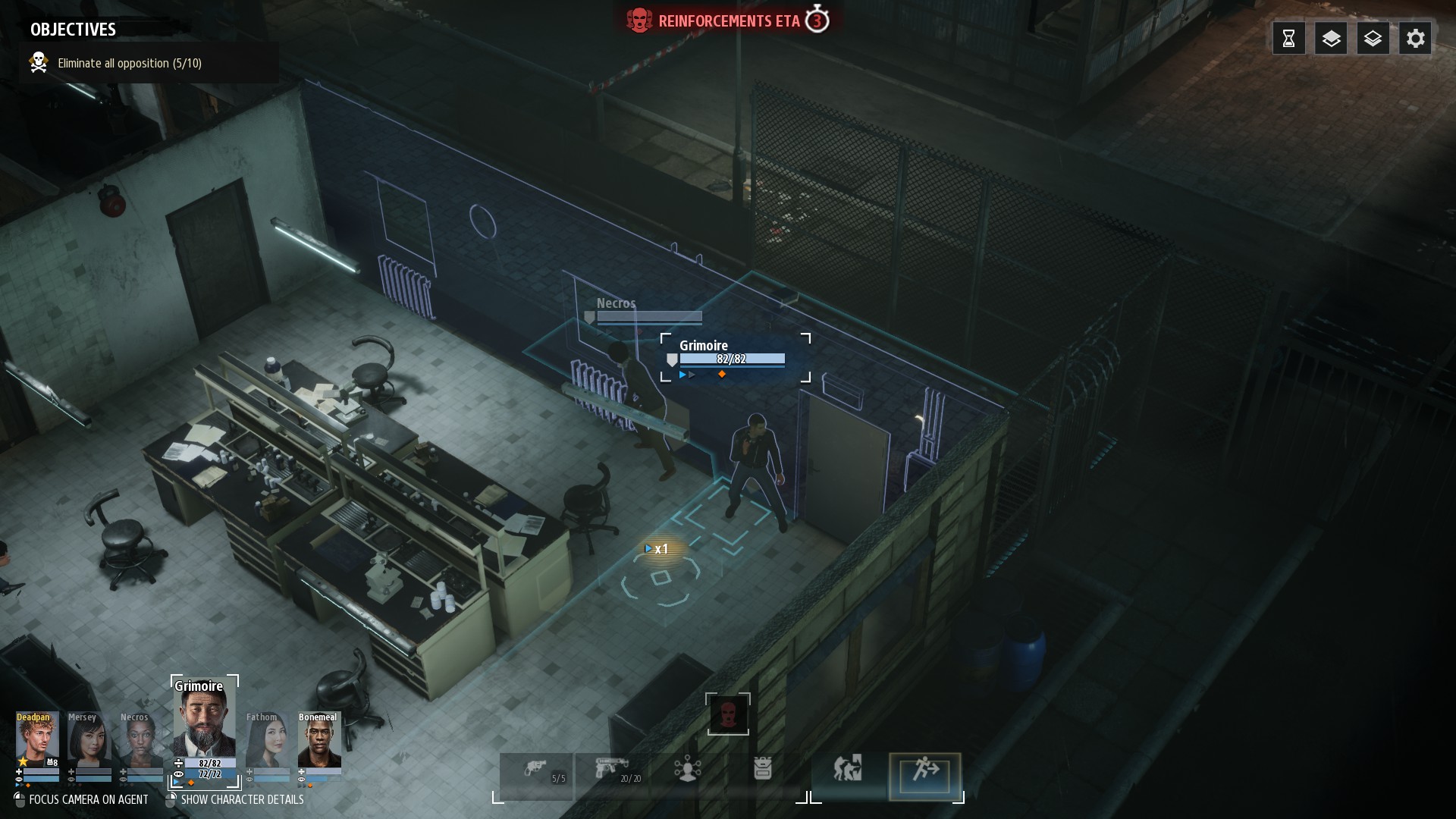
On one occasion an agent sounded bored and exasperated when it was revealed I’d walked into a trap, mirroring my feelings exactly. Playing as the KGB has the advantage of disguising lacklustre acting in Russian, though if you do want to keep track of what’s happening you’ll have to spend longer on each mission as you stop to read what’s being said. You will not want to spend longer on each mission.
They’re either trivially easy or infuriatingly difficult, but they never provide an interesting challenge. As with XCOM, units typically spend their turns moving then shooting, using equipment or activating special abilities. Unlike XCOM, chance plays a much smaller role. It’s not a dice that determines whether a bullet will hit or how much damage it will do, but an awareness bar. Awareness acts as both armour and a resource for using abilities: if the bar is full, then incoming shots will do a minimal amount of damage or miss entirely. If it’s empty, those bullets will tear into an agent’s health rather than their awareness.
As with all things Phantom Doctrine, it’s a concept I was initially intrigued by but quickly wound up frustrated with. Weighing up whether to use your awareness on a headshot that will leave that agent vulnerable is an interesting decision, but that’s not enough to make up for how the system winds up draining battles of their tension. Rather than holding my breath as my units took aim, I knew what every bullet was going to accomplish. Without chance to spice up the action, it tasted bland.
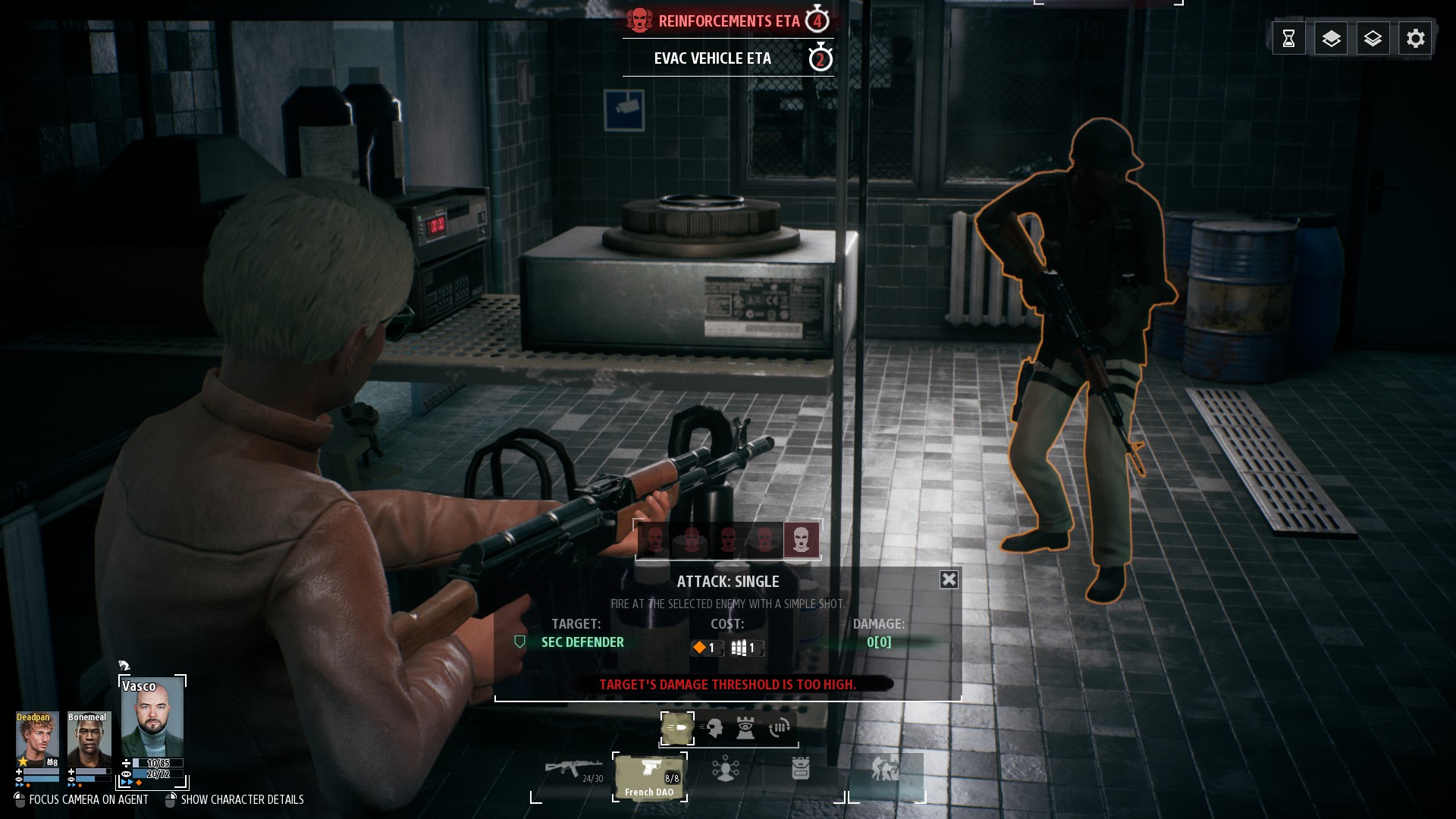
That’s a fundamental problem with combat, and it’s not the only one. There’s no indication as to whether a unit will be able to fire at an enemy before you’ve moved them to a new spot, which cast a headachey uncertainty over every order and resulted in much gnashing of teeth and loading of saves.
Exciting abilities and distinctive weapons might have helped, but both are lacking. The Cold War is a more restrained setting than XCOM’s, but there’s definitely space for spy gizmos that hasn’t been explored. Running faster and preventing an enemy from firing for a turn are two representatively underwhelming abilities, and while the weapon types do have different characteristics they seldom altered my plans for each unit. Those units level up, but they all choose from the same pool of perks that don’t significantly change their capabilities.
There’s an exception to that, which brings me back to what makes missions trivially easy. If you send a couple of agents to recon a mission, you then get to start that mission with two agents having already infiltrated the area wearing disguises. That means they can safely stroll past guards and security cameras, and are only rumbled if they’re spotted by special enemy agents – but not if they’ve got the right perk. Once I discovered that, I fell into using the same tactic on every single outing. Let me introduce you to the cleaners.

The cleaners are brutally effective, but gosh are they boring. Each turn, they walk into a new room together. Each turn, one of them uses a silent takedown on an unsuspecting enemy, and then the other uses their action to magically hide the body. They can usually do this in a crowded room, picking off targets that aren’t in anybody else’s eyeline. They turn espionage into busywork.
After a while, I stopped bothering to even bring in my other agents because the only thing they brought to the table was extra faff. Occasionally, the cleaners would would run into a hiccup – you can only perform takedowns on enemies with lower health than the take downer. Normally they could just ignore those beefcakes, but on the (depressingly frequent) missions where the aim was to eliminate every opponent, all they needed to do was save those enemies until last. Eventually I built a facility that let me inject them with health-boosting chemicals and didn’t even need to do that.
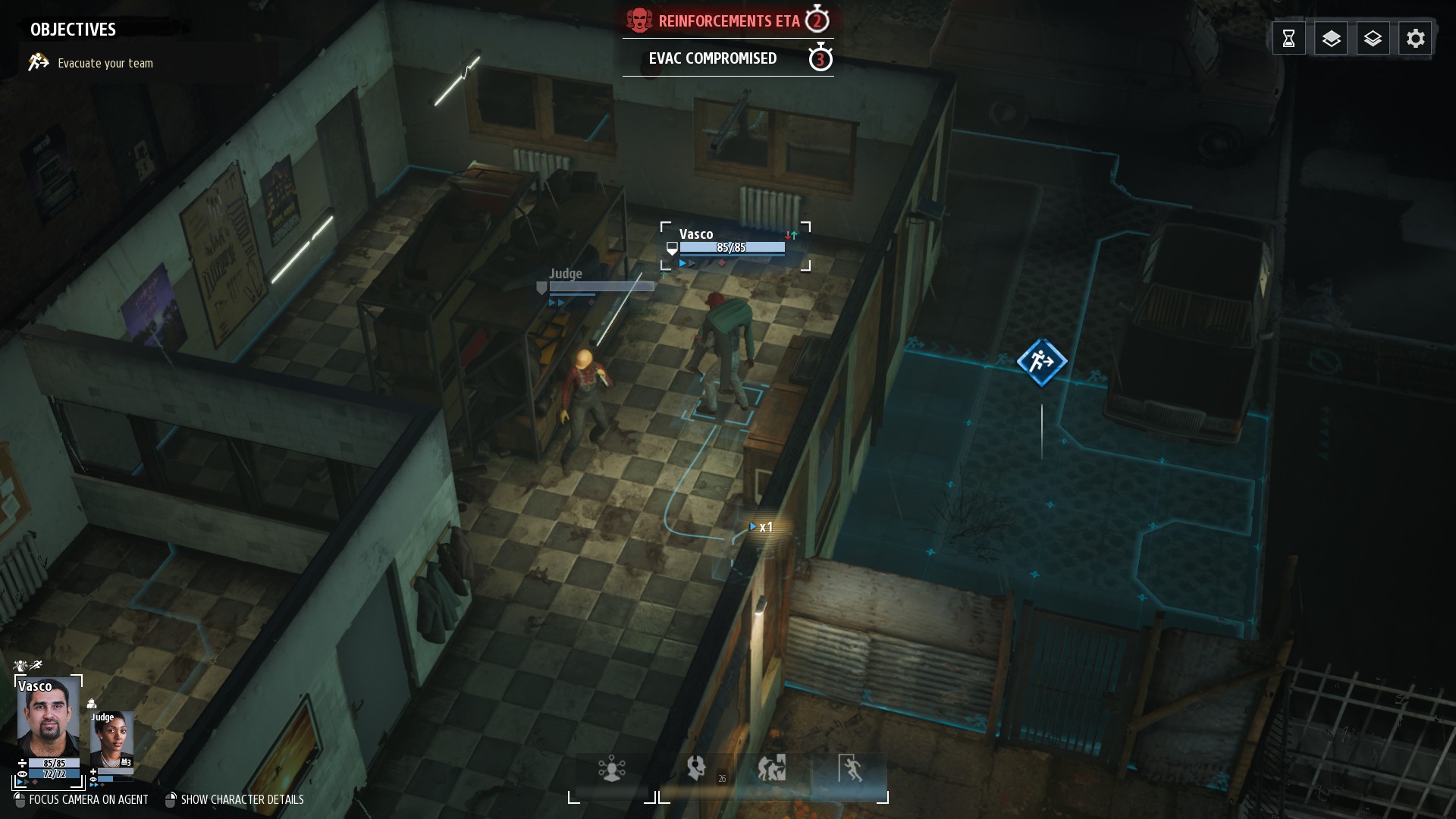
That’s one of several unlocockable facilities, in addition to a couple that you start with. One of the unlockable ones lets you interrogate, convert and indoctrinate captured enemy agents. You acquire more options as the game goes on, including what must be Phantom Doctrine’s snazziest feature. Once you can afford to, you can indoctrinate a captured spy with a codeword, then release them back into the wild. When you encounter them again, you can flip them to your side.
I never bothered using it. My cleaners were enough.
From the start you have a workshop where you craft new items and research upgrades that affect the strategic layer, like increasing your income or the frequency of informants that appear on the global map. Those informants give you files which you can also laboriously collect on missions, before you laboriously go through them on the investigation board.
In Phantom Doctrine, unpicking a tangled web of conspiracy does not involve applying a skill. You just need to scan documents for key names, then connect documents with the same words until a message pops up informing you you’ve cracked the case. Those are usually boring snippets of heavily redacted communication, worthy of a chuckle at the outlandish codenames but little more.
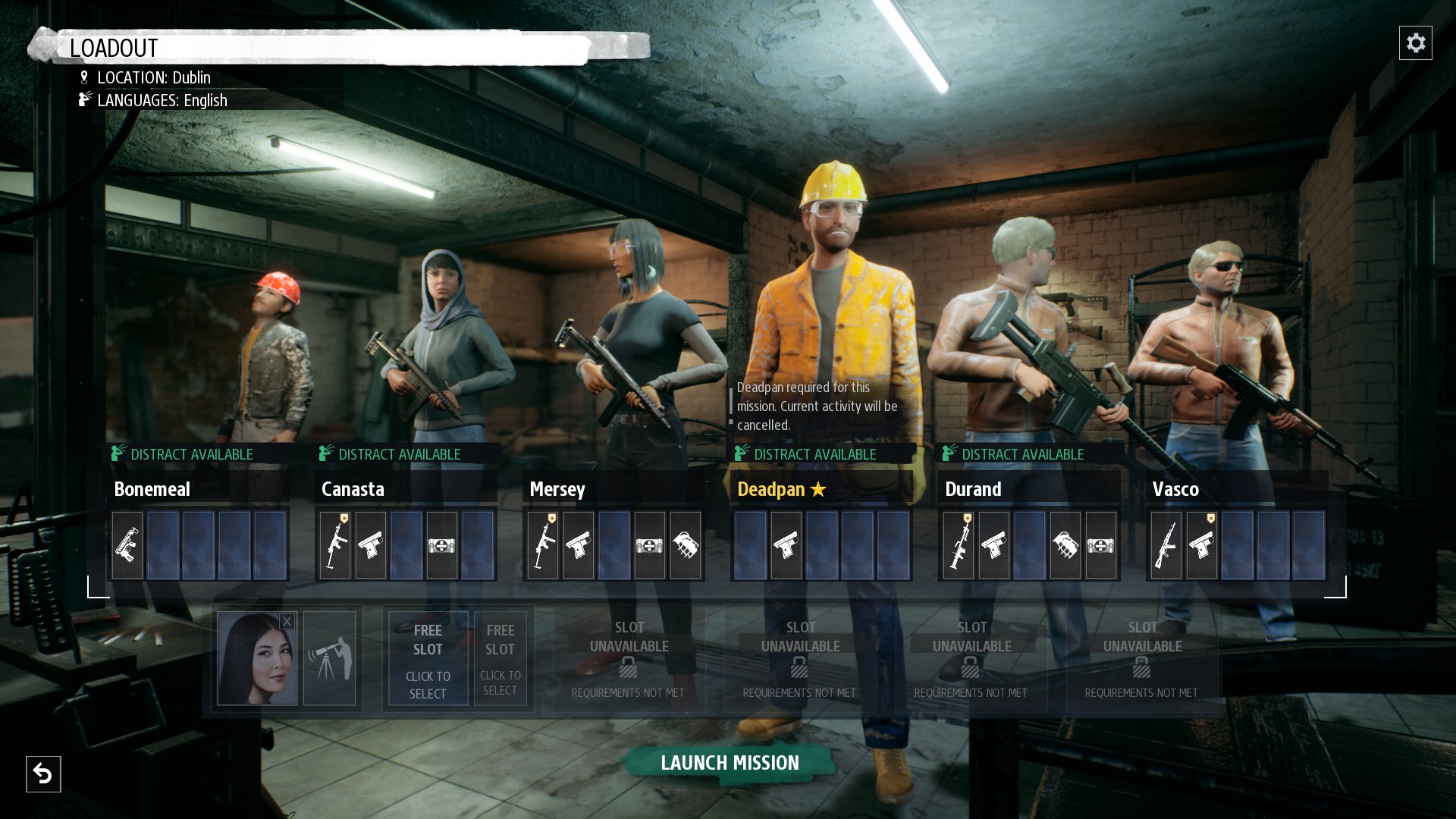
There’s plenty to manage in your base, from crafting items to clicking agents into slots that automatically work the investigation board for you. It feels like administration, and the layer where you dispatch spies around the world does too. Little decisions involving your agents sometimes pop up with the promise of being interesting, but they crop up sparsely and are written more sparsely still. One of my agents got depressed, I couldn’t afford to give him time off, and a while later he killed himself. Another one got cancer.
Maybe I’d have cared about those agents if I hadn’t felt ostracised from the story, but it’s not just that. It’s hard to invest in a fantasy where the people I’m doing spy shit against are terrible at countering spy shit. My shadowy foes leave prisoners in random rooms with just one easily disabled camera watching them. They stand around as people gallivant about their secret bases, smashing through windows and disabling the laser security systems they’re standing right next to. They’re never suspicious of the cleaners.
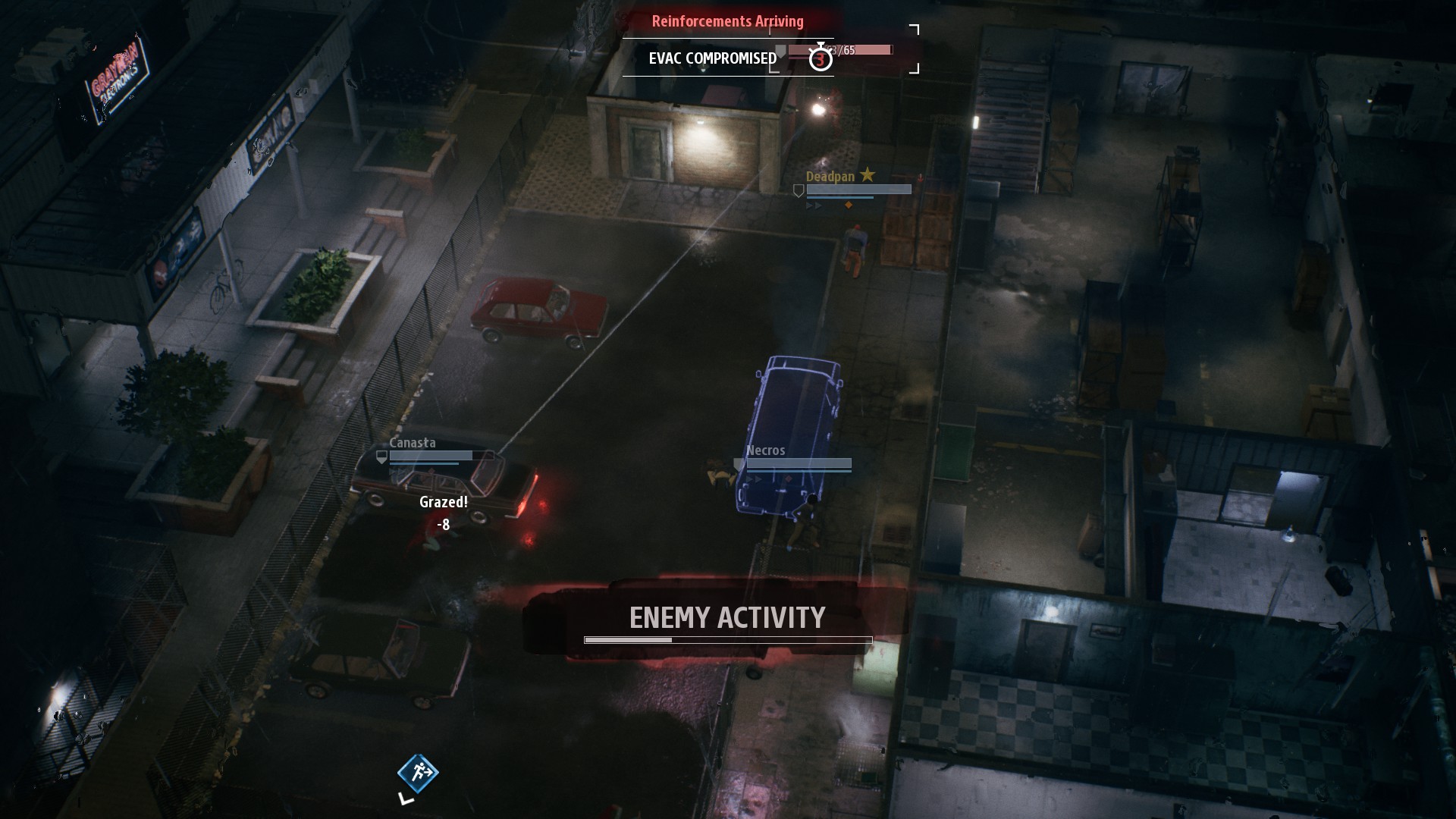
I did have one agent fleece me for several thousand dollars, then defect to the other side. Maybe I could have told you a cool story where I captured her and converted her back, but that wasn’t to be. A bug meant that I’d have to load a save from several hours before to progress that plot, and at that I stopped playing. I had a fair few crashes too, and on one occasion I had to repeatedly load a save when the “enemy activity” bar got stuck, presumably because a guard I couldn’t see kept stumbling into a pot plant or something.
The AI often bumbles around making odd decisions, like not firing at a guy I’d left standing in the open with a casualty slung over his shoulder. Such technical errors compound the design ones, which usually revolve around not being told stuff that I should be. A perk made “snap shots” no longer end an agent’s turn, but at no point was it mentioned what a snap shot was. For maybe 20% of shots, the camera lined up in such a way that I couldn’t see my target’s health. If you’re discovered on a mission, reinforcements flow in – at an undisclosed location, sometimes right on top of your squad. Instead of reinforcements, sometimes a helicopter will hover above threatening to “shoot at any agents in the open without warning”. There is a warning. That tooltip was flat out wrong, and I spent much of the game hindered by it.
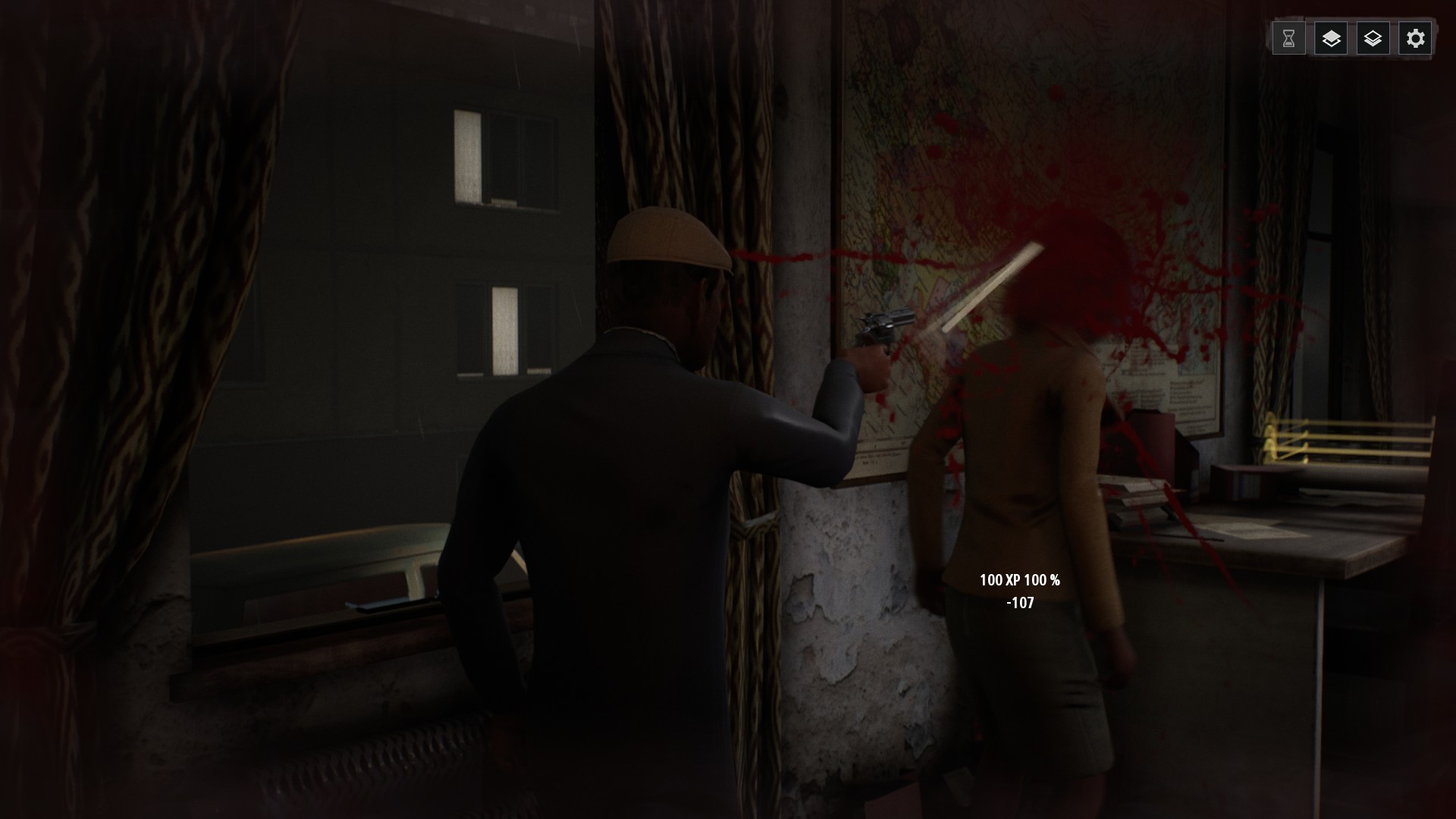
For a game about spies, Phantom Doctrine is atrocious at providing you with information. It doesn’t set up its pieces in an interesting way, it just pretends to – and while it has some neat ideas I haven’t gone into detail on, that’s because I so rarely needed to engage with them.
If you want stealthy XCOM, go play Invisible Inc.















Phantom Doctrine review
Phantom Doctrine convinces in taking XCOM to the Cold War era - but doesn't change enough to shake off its inspiration
After days of radio silence, one of my best agents has returned to base – a glorified car park under Vladivostok. Don’t get me wrong, I’m delighted. The last time I saw Indigo she was bleeding out onto Soviet concrete as I hopped into the back of a waiting RAF-2203 Latvija. The question is whether that turn of events damaged the employer-employee trust at all. Has she shown up with a single hit point as a result of a dramatic escape from her captors, or because said captors have roughed her up to reduce suspicion around their new double agent?
There’s already enough unease in the smoky corridors of The Cabal – our independent spy operation. Only last week, agent Empire tracked down the torturer responsible for holding her in a Turkish military prison for a decade. I couldn’t afford to hire a hitman, so let her head off to exact a more personal form of revenge. Days later, the Turkish media ran a story about the massacre of a jailer and his family. When Empire returned, the game informed me she was now ‘loyal’. I suppose this should be reassuring – but if she’s loyal now, what was she before?
These are Phantom Doctrine’s standout moments: the times when it feels like a proper ‘80s espionage thriller. At others, it feels like XCOM 2 on a counterfeit passport.
A typical tactical mission in Phantom Doctrine begins with a handful of agents infiltrating a tiled map. In among this network of multi-level buildings and patrolling guards is something they intend to take: a classified document on a desk, an informer in a cramped cell, or the life of an enemy agent. Over the course of a number of turns, you guide them to this goal, disabling security cameras and bopping bobbies on the head as you go. Often the act of fulfilling your objective will alert your opponents, and combat initiates as you steer your team to the evac point. The longer you stay hidden behind cover to take potshots at your enemies, the greater the risk of reinforcements will turn up – that, or the rumbling engine of the evac van will compromise the anonymity of your base.
It’s a tightly-designed structure that grants every mission a challenging shape and consistent tension. And it would be a radical rework of the XCOM formula that deserves celebration if not for the fact that Firaxis had already brought about this reinvention two years earlier.
There is a lot about Phantom Doctrine that deserves to be celebrated. CreativeForge Games, the developer behind the similarly XCOM-adjacent Hard West, has absolutely nailed the atmosphere of Cold War genre fiction. The main menu is a work of art, depicting a poorly-lit basement office where redacted documents sit under the glow of desk lamps. Soviet propaganda posters cling to exposed brickwork, and the emergency broadcast message of a tiny television is partially obscured by the smoulder of a recently used ashtray. That distinctive cigarette smell of analogue-era spydom seeps directly into the design of your home base, and the game as whole – which is set to a discordant jazz soundtrack, because what else?
CREATIVEFORGE HAS NAILED THE ATMOSPHERE OF COLD WAR FILMS
In character creation I created my own Georgina Smiley, an old-fashioned spy with an air of anti-charisma as thick as her rimmed glasses. I could have chosen to make her a member of the CIA, but instead plumped for a highly-decorated KGB officer, granting me a strategic map view over the USSR and a campaign story to match.
It’s on this map that you manage your espionage network, sending individual agents to monitor suspicious activity across the country. Whenever you press play, you’re dealing with the uncomfortable knowledge that, somewhere under your nose, enemy agents are working to undermine you. Your aim is to uncover their operations and counter-spy on them. The sooner you cotton on, the more options you have for surveillance and planning before launching into a tactical mission. These sequences might be analogous to XCOM 2’s Guerilla Ops, but also provide some of Phantom Doctrine’s best touches: the off-map spotter who lifts the fog of war on one side of the map, for instance, or the single agent you can field in disguise.
There’s a unique thrill to kitting out a trained killer in office wear and having them potter between the guards, slipping into forbidden areas to disable the cameras. In fact, while XCOM 2 built a full-fledged stealth system but eventually expected you to leave it via discovery or ambush, Phantom Doctrine deserves credit for letting you lean on those systems indefinitely. The most satisfying missions are those where you get in and out without raising any alarms at all, and the game rewards you appropriately.
Phantom Doctrine is full of pleasant touches, if not enough fundamental change. There’s the simple takedown mechanic that lets you put anybody to sleep instantly, so long as you’re stealthed and have higher HP. The breach orders for when you need to drop the occupants of a room simultaneously. And enemy air strikes in the moments when stealth is but a distant memory, forcing you to keep away from the windows.
CreativeForge’s take on aiming is less successful, ditching the famous percentage chance that’s the source of so much of XCOM’s tension. Instead, damage is reduced to survivable levels by cover, armour, or dodging. That takes away the frustration of a miss, but means you spend the closing moments of many missions watching your heroes getting chipped away at from all sides, like Greek statues in the making.
I’m not sold on damage’s relationship to a stat called awareness, either. Dramatic acts like takedowns use up an agent’s awareness, which is restored gradually over time or in larger doses by special abilities. When it’s low, you’re far less likely to dodge damage – which in practice means you’re punished for bold moves with an agent full of holes in the subsequent enemy turn.
That’s especially frustrating when occasional bugs can change the course of a mission – like the policeman who shot directly through a wide staircase to incapacitate Ms Smiley. At least comic relief came a turn later, when the agent carrying Smiley’s body walked slowly through a plate glass window, smashing it to pieces. Using the door next to it would have lost us a tile of movement, I suppose.
Most disappointing is the mechanic that promised to be Phantom Doctrine’s one wholly unique element: the cork board. For a contemporary reference point, think the Always Sunny in Philadelphia meme – a series of implausible connections tied together by string. This is where the intel nabbed during missions, obtained through informers, or revealed by investigation back at base, ends up. Once the action dies down it’s up to you to dig through the files, scan documents for names that scream ‘codeword’, and then link those words up with other places they appear on the board.
While thematically fun, these puzzles are so unchallenging as to feel like busywork – so long as you can recognise a noun, you’re an expert analyst capable of bringing down Jason Bourne. The contents of those documents are a missed opportunity for storytelling, too – instead filled for the most part with spy-like gobbledegook, mere background noise to the nouns.
It’s concerning that Phantom Doctrine’s main plotline, the one you’re often working to progress, is sometimes indistinguishable from that gobbledegook. One story sequence, the result of much spent string and many lives risked, ended in my being promoted to the head of an independent, above-top-secret espionage agency. Which, well, hadn’t I been that for the previous ten hours? Like so many of the Hollywood spy thrillers it emulates, the story of Phantom Doctrine comes off as convoluted nonsense. The problem is that it asks you to work so hard for it.
As the rain beats down on Soviet streets and the van speeds in for yet another evac, it’s hard not to enjoy Phantom Doctrine. It’s an often impressive example of the reborn turn-based tactics genre, built with an intimate understanding of how the layers of its inspiration interplay and an eye for areas where the formula can be tweaked.
Phantom Doctrine review
You might well find the evocative, smoke-damaged backdrop of ‘80s espionage fresh enough to carry you through a satisfying playthrough. But even with the plates changed and the serial number filed off, there’s no mistaking XCOM 2.















I dont know - it wouldn't surprise me if the gameplay is somewhat shallow in areas. Some of it seems whiny, but the combat system always seemed a little... not ideal? Not my preference? Still looking forward to playing though.Those reviews are a joke. The pcgamesn review sounds like the guy only played the game up to a point and wrote a "review" based on that.

"game journalists" are degenerates that belong on a crossPretty split reception so far from the "game journalists." Looks like the ones who didn't care for it were mainly expecting an nu-XCOM clone and didn't get it. 78 on metacritic right now.

As with all things Phantom Doctrine, it’s a concept I was initially intrigued by but quickly wound up frustrated with. Weighing up whether to use your awareness on a headshot that will leave that agent vulnerable is an interesting decision, but that’s not enough to make up for how the system winds up draining battles of their tension. Rather than holding my breath as my units took aim, I knew what every bullet was going to accomplish. Without chance to spice up the action, it tasted bland.
I have been watching the streams of gameplay since yesterday and that review guy is a joke. Claiming it is just a version of Xcom 2 was beyond retarded. No Xcom 2 did not do stealth mission before this game, what Xcom 2 has can barely called stealth. Even LW2 version of Xcom 2 concealment system is not even close to what PD offers.I dont know - it wouldn't surprise me if the gameplay is somewhat shallow in areas. Some of it seems whiny, but the combat system always seemed a little... not ideal? Not my preference? Still looking forward to playing though.Those reviews are a joke. The pcgamesn review sounds like the guy only played the game up to a point and wrote a "review" based on that.
They do NOT tell you everything. I have an early copy from a friend, and it took me 3 restarts worth of 3 hour playthroughs to understand every single systemBeen playing for an hour now. The combat, while looking nice is way worse than nuXcom, thanks to that awareness system. It just feels way too arcadey to me, on top of an already arcadey game... The game would actually be better if it copied nuXcom straight off, because then you would know what to expect and taking cover in that game actually have a chance of reducing incoming fire to zero. Now it's more of a weird mix between nuXcom and a deterministic system that has no fun allowed stomped all over it. Combat just feels off.
Base stuff seems intriguing except I have no idea what is going on. I keep getting snippets of information about some agent and some organization, but I have no idea why I'm getting all this information, and how. It just lands on my lap and I have to draw a connection between it all. Why am I doing this? Is my guy already a super agent - is he a veteran from past spy activities? What is the goal here? The only thing I know it has something to do with nukes I guess.
I don't know. I have one more hour to try stuff out.
They do NOT tell you everything. I have an early copy from a friend, and it took me 3 restarts worth of 3 hour playthroughs to understand every single system

Now sure what you are on about, cover in nuXcom does not reduce incoming damage unless you had a special perk. You might have confused it with Long War mod for Xcom 1 that introduced cover reducing damage.Been playing for an hour now. The combat, while looking nice is way worse than nuXcom, thanks to that awareness system. It just feels way too arcadey to me, on top of an already arcadey game... The game would actually be better if it copied nuXcom straight off, because then you would know what to expect and taking cover in that game actually have a chance of reducing incoming fire to zero. Now it's more of a weird mix between nuXcom and a deterministic system that has no fun allowed stomped all over it. Combat just feels off.
Base stuff seems intriguing except I have no idea what is going on. I keep getting snippets of information about some agent and some organization, but I have no idea why I'm getting all this information, and how. It just lands on my lap and I have to draw a connection between it all. Why am I doing this? Is my guy already a super agent - is he a veteran from past spy activities? What is the goal here? The only thing I know it has something to do with nukes I guess.
I don't know. I have one more hour to try stuff out.







